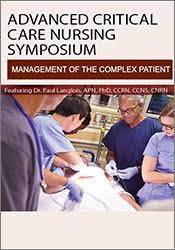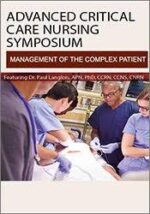Available for Pre-Order. This product will be available within a few days.
Dr. Paul Langlois – Advanced Critical Care Nursing Symposium Day 1
Take your practice to the next level with cutting-edge strategies for the most challenging & complex patients
Working in the rapidly changing critical care setting, you need to be, up to date on the most current and cutting-edge strategies and interventions to care for these high acuity patients. Get the latest and greatest in this exciting and engaging conference, where expert, Dr. Paul Langlois, APN, PhD, CCRN, CCNS, CNRN, will challenge you to take your knowledge to the next level. He will discuss the most common, yet most challenging cases, that critical care nurses are working with each day:
Heart Failure
STEMI & NSTEMI
Pneumonia
ARDS
Ischemic & Hemorrhagic Stroke
Renal Failure
Multi-system Failure
Attend this comprehensive program and leave with practical, immediately applicable strategies to gain better patient outcomes and enhance your expertise. Don’t miss this opportunity to network with your peers, learn from an expert in the field, and leave with a renewed commitment to achieving excellence in critical care nursing.
OUTLINE
Case Study: The patient with Heart Failure (HF)
Preserved Ejection Fraction vs. Reduced Ejection Fraction
Physical Assessment Findings
How to Appropriately Classify HF
Labs to Aid in Diagnosis
Medications for Heart Failure
Four Classes of Diuretics
Three Inotropic Agents
Minimizing HF Symptoms
Angiotensin Converting Enzyme Inhibitor
Aldosterone Receptor Antagonists
Echocardiogram Interpretation
Electronic Support of the Heart
AICD, Biventricular Pacing
Three Trouble Shooting Techniques
Decompensating HF Treatment
Ventricular Assist Devices (VAD)
Five Indications & Contraindications
Six Trouble Shooting Techniques
Driveline Infections
Recognition & Treatment
Case Study: STEMI and NSTEMI
Diagnosis: STEMI vs. NSTEMI
Lab Data: Troponins and CK-MB
Patient Signs & Symptoms
12-Lead Interpretation
Inferior, Lateral & Anterior Wall MI
How to Identify Axis Deviation
Differentiating Left from Right Bundle Branch Block
Recognizing Bifacicular Blocks after MI
Medication Management
Beyond Aspirin, Oxygen, Nitroglycerine & Morphine
Indications for Using TPA
Three Factors to Consider when Dosing Heparinoids
Glycoprotein IIb/IIIa Medications for STEMI
Intravenous Direct Thrombin Inhibitors
Monitoring Parameters
Thienopyridines
When to Administer
Four Indications for:
Angiotension Converting Enzyme Inhibitors
Angiotension Receptor Blocking Agents
Indications for Statins
Three Indications for Vitamin K Receptor Antagonists
Stop the NSAIDS
Percutaneous Interventions
Drug-eluting vs. Bare Metal Stents
Balloon Angioplasty
Coronary Artery Bypass Surgery is NOT for Everyone
Cardiogenic Shock after MI
Pulmonary Artery Catheter with Venous Waveform Analysis
Cardiac Output Determination by Pulse Contour Methods
Extracorporeal Membrane Oxygenation (ECMO)
Indications & Contraindications
What do the Numbers Mean?
Would you like to receive Dr. Paul Langlois – Advanced Critical Care Nursing Symposium Day 1 ?
OBJECTIVES
Investigate current clinical guidelines and management strategies for heart failure.
Review important pharmacologic principles essential for safe and effective care.
Assess the most prevalent inotropic agents used in the management of heart failure.
Describe the mechanisms of action of mortality-reducing pharmacological agents used in the treatment of MI and HF.
Compare anticoagulants which are most beneficial to the patient with MI.
Compare physical assessment findings to hemodynamic parameters in a patient with decompensated heart failure.
Review potentially fatal arrhythmias found on the EKG.








